Why the Disney hotel at National Harbor is something to worry about
A long time ago I wrote a blog entry about the Walmart business model ("Jumping in bed with the devil--it's hot, but will you survive the heat?"). In the old days, department stores were content to not sell a customer "everything," so a complementary commercial district was able to coexist around department stores, which served as "anchors," attracting customers to the district, customers who not only shopped at the department stores but at the surrounding stores, restaurants, service businesses, and even cinemas and other entertainments.
The Walmart model is different. They want you to spend every dollar that you spend on consumer goods and services in their store. There is no place for other stores adjacent to their own, because as far as Walmart is concerned, their customer has no reason to shop anywhere else. 50% of U.S. residents visit Walmart weekly.
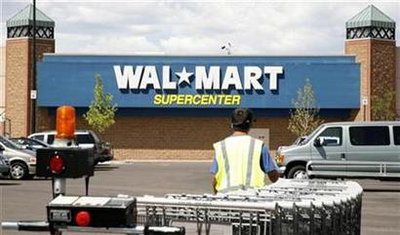
A worker brings carts back into a Walmart store in Westminster, Colorado August 14, 2008. REUTERS/Rick Wilking
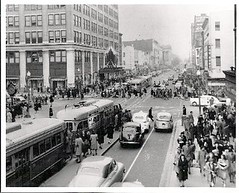
Department stores like Woodward & Lothrops anchored downtown's retail district, leaving room for other stores, especially on F Street and 7th Street. (F Street in the 1950s is pictured below.)
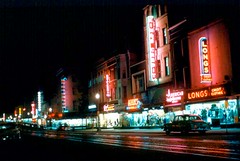
The article about National Harbor in Wednesday's New York Times, "A Resort Downriver From Washington," reminds me that I have been meaning to write about this in terms of tourism and competition for business between various destinations in the Washington region.
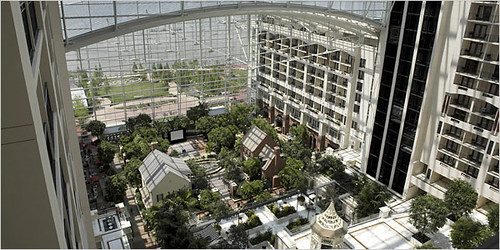
Consuming "Washington" indoors and/or on the National Harbor "campus". Daniel Rosenbaum for The New York Times. The Gaylord National Resort and Convention Center has an 18-story glass atrium and 2,000 rooms.
Sadly, the National Harbor convention-resort development in Prince George's County is designed more along the Walmart model than the old department store model. Sure, National Harbor is close to Washington, DC, the nation's capital and one of the nation's leading tourist destinations, but at the end of the day, the proprietors of the businesses there, the developer, and Gaylord National Resorts, the primary manager of the property, want you to stay on-site 24/7 and spend all of your dollars allocated for travel on a trip to "Washington" there and no where else.
So in short, I disagree with the head of DC's convention and visitors bureau (called DestinationDC), that the Disney Resort hotel benefits Washington, DC proper. See "Tourism officials: Disney at National Harbor good for region" from the Washington Business Journal. From the article:
Tourism and hospitality leaders throughout the D.C. area say they are excited for the potential boon a planned Walt Disney Co. resort hotel could bring to the region, with District officials unconcerned that the project will draw business away from the city’s convention center. Disney plans to build a 500-room hotel resort on 15 acres at National Harbor in Prince George’s County.
Bill Hanbury, CEO of Destination D.C., said the Disney move will mean a new market for the city — from visiting families familiar with the brand and from the resort-going community.
“At the end of the day, they’ll be here because they want to visit D.C.,” Hanbury said. Hanbury said he does not believe the Walter E. Washington Convention Center will suffer from Disney’s presence in Prince George’s County, whether it be from conventions booking with Disney or the Gaylord National Resort, also at National Harbor.
“From a convention perspective, we’re from different markets — people come to the convention center when they want an urban, pre-eminent convention facility,” Hanbury said.
Instead, Disney aims to process your "Washington" experience for you, with their guides, taking you to the free places (the Smithsonian Museums) but charging you for it, and taking you back to National Harbor to spend your money on food, hotel, and sundries. All the tourism tax benefits (sales tax, meals tax, hotel tax, parking tax, rental car tax) end up in Maryland.
I don't see how that's good for "the region" or for Washington, DC proper. I do see how that's good for Maryland and for Disney and for the owners of the National Harbor development.
And DC needs to consider why it is that the city--which is one of the biggest destinations in the country for families and for adolescents on class trips--isn't competitive in terms of providing hotel rooms to those market segments. (I know why, but it's the business of DestinationDC to expand and extend the competitiveness of the city's "tourism offer" not to tout expansions of the tourism offer in Maryland. It's their job to address the problem. Not mine, even though I will be offering an amendment to the Comp Plan next week, calling for the development of an element on Tourism Development and Management.)
DC must not let itself get outmarketed by the Walmart model.
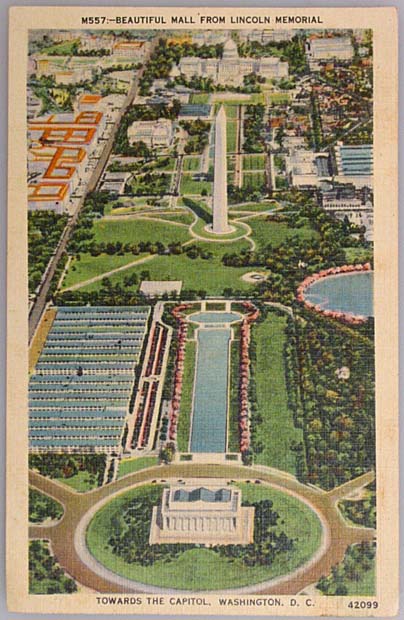
Labels: building a local economy, cultural heritage/tourism, economic development, tourism



0 Comments:
Post a Comment
<< Home